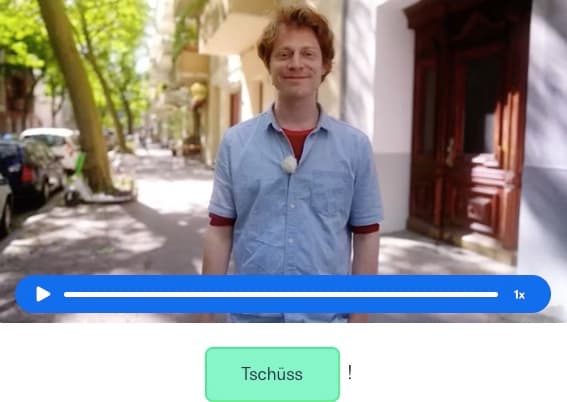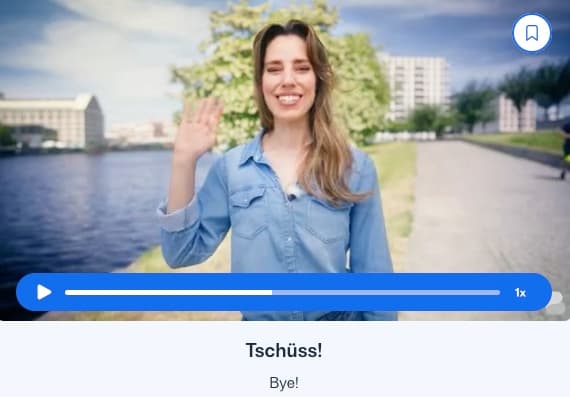I want to learn...
Greetings are one of the first things you learn in any new language, and knowing how to say goodbye in German will help you leave things on a good note when interacting with native speakers.
Saying goodbye in German is possible in many different ways, and knowing what to say depending on the context is important. We’ll cover what to say and when, so you can start speaking confidently in no time.
Saying goodbye in German: Key phrases
Because there are multiple ways to say goodbye, we’ll start by looking at the basics. The example dialogue below shows you two common ways of saying farewell, one informal and one formal.
Paul: Tschüss, wir sehen uns! (Bye, see you around!)
Thomas: Auf Wiedersehen! (Goodbye!)
The word tschüss (bye) can be used in both formal and informal settings but it is more common in informal ones. There is also a variety of ways to spell it. But since you will mostly speak it that does not matter much.
To say goodbye to your friends, you’ll likely do so informally. Here are other informal ways to say goodbye:
Tschüssi (Bye) / Tschüssikowski! (jokingly)
Ciao (Bye) — This is borrowed from Italian, but is quite commonly used as a farewell.
Mach’s gut (Take care)
Hau rein (See ya)
Auf Wiedersehen (goodbye), on the other hand, is slightly more formal. You’ll hear it used by people of all ages and in many different situations, like, for example, shop assistants saying goodbye to their customers. It also happens a lot that people leave out the “Auf”, which gives your goodbye a slightly less formal touch. So, saying just “Wiedersehen!” is fine, too.
Shop assistant: Vielen Dank für Ihren Einkauf, Frau Müller. (Thank you for your purchase, Ms. Müller.)
Frau Müller:Danke Ihnen! Wiedersehen.(Thank you! Goodbye.)
Shop assistant: Auf Wiedersehen(Goodbye.)
Below is another conversation, this time between Helene and a sales clerk she knows well. Notice that due to the familiarity, they can use an informal way to say goodbye:
Sales clerk: Vielen Dank für deinen Einkauf. (Thank you for your purchase.)
Helene: Danke dir, bis bald! (Thank you, see you soon!)
Sales clerk: Tschüss, bis zum nächsten Mal!(Bye, until next time!)
Tip: Want to learn how to greet people in German? See how to say hello in German and sound like a native speaker with
Other ways to say goodbye in German (informal)
There are many informal ways to say goodbye in German, and they each have nuanced meanings and are used in different situations.
1. Mach’s gut
This means “take care”. This is a very casual way of saying goodbye and you’d only use this one with close friends.
2. Man sieht sich
This is along the lines of “I’ll see you when I see you”. You’d use this option in an informal situation when you’re not exactly sure when you’ll see the other person again or you haven’t planned your next meetup. You can use it with friends or acquaintances, but don’t say it to superiors.
Another variation is Wir sehen uns dann (see you then), which is another version of Wir sehen uns we saw at the beginning of the article. Adding the little word dann changes the meaning from “see you later” to “see you then”.
3. Bis später
This is another classic casual way of saying goodbye and simply means “see you later”. But contrary to English, this often literally means “see you later today”.
4. Bis dann
This version is similar to Bis später, but vaguer and means “see you whenever”.
In addition, you could get more specific and either say Bis morgen (see you tomorrow), or Bis Montag (see you on Monday), and so on.
Likewise, you could also refer to a specific time, such as Bis halb sieben (see you at 6:30) or Bis um acht (see you at 8).
5. Bis gleich
Literally means “see you in a bit”. This version is used when you know that you’ll see the other person (again) in a short period of time, such as in a few minutes or an hour.
6. Gute Nacht
This means “good night”. You’d usually say this to someone in the evening when you leave to go home and/or to bed, or the other person is going to sleep soon. Consequently, and contrary to its counterpart Guten Tag (good day), you cannot use it to greet someone.
Tip: If you want to make Gute Nacht sound less informal and more polite, you’d have to say something along the lines of “Ich wünsche Ihnen eine gute Nacht” (I wish you a good night).
7. Schlaf gut
It means “sleep well”. This is another way of bidding someone farewell who is going to sleep soon, and we only use it in informal situations.
For example, when you leave an office party, you wouldn’t say Schlaf gut to your manager but rather Gute Nacht. Save Schlaf gut for when you’re leaving a gathering of family or friends. In a setting with children, you might also use Schlaf schön, which means the same but is a bit more playful.
Now you know how to say goodbye in German
There are many different ways of saying goodbye in German, and now you know several informal and formal phrases and when to use them.
We know it’s hard to say goodbye, so why not keep the momentum going? Take a look at how to speak German fluently and keep practising your German today.
Newlanguages


